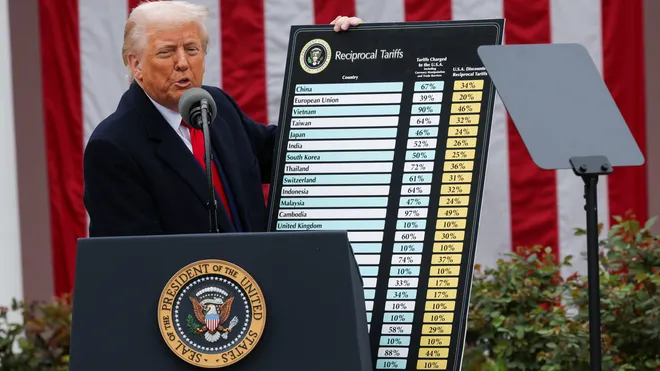President Donald Trump threatened to demolish much of the global economy’s structure and start wider trade conflicts on Wednesday by announcing extensive new tariffs on almost all U.S. trading partners, including a 34% tax on imports from China and a 20% tax on imports from the European Union.
In response to what he described as an economic emergency, Trump said in the Rose Garden that he was slapping a 10% baseline tax on imports from all countries and raising tariff rates on dozens of countries that have significant trade surpluses with the United States.
The president, who said the tariffs were designed to boost domestic manufacturing, used aggressive rhetoric to describe a global trade system that the United States helped to build after World War II, saying “our country has been looted, pillaged, raped and plundered” by other nations.
The move amounts to a massive tax increase that may cause the international order to collapse. It disrupts the alliances formed to preserve peace and economic stability and sets the stage for what might be a painful shift for many Americans as middle-class necessities like housing, cars, and clothes are predicted to become more expensive.

Trump claimed he was taking action to restore fairness to international commerce and generate hundreds of billions of dollars in new revenue for the US government.
“Taxpayers have been ripped off for more than 50 years,” he said. “But it is not going to happen anymore.”
To impose the tariffs, Trump proclaimed a national economic emergency. Although he has stated that the taxes will bring factory jobs back to the United States, his proposals run the risk of causing an abrupt downturn in the economy because they may result in significant price increases for both businesses and consumers.
By using the 1977 International Emergency Powers Act to impose what he dubbed “reciprocal” tariffs on trading partners without the approval of Congress, Trump was carrying out a major campaign pledge. However, his move on Wednesday would put Trump’s mandate to fight inflation from the last election in jeopardy.


